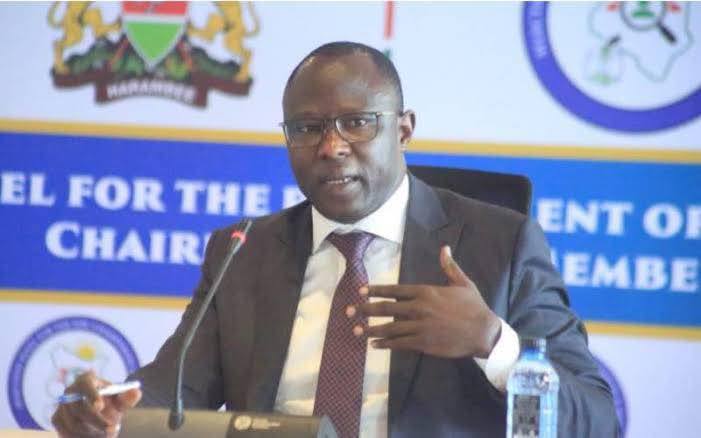President Ruto's surprise pick for IEBC chair

Erastus Edung Ethekon picked by President William Ruto as the new Chairperson of the Independent Electoral and Boundaries Commission (IEBC),
By Kiptoo Kennedy
Published on May 8, 2025
President William Ruto has nominated Erastus Edung Ethekon as the new Chairperson of the IEBC.
Edung is a surprise pick out side speculation that many expected President William Ruto to announce.
Edung was picked alongside six commissioners Ann Njeri Nderitu (Nyandarua), Moses Alutalala Mukhwana (Kakamega), Mary Karen Sorobit (Uasin Gishu), Hassan Noor Hassan (Mandera), Francis Odhiambo Aduol (Kisumu), and Fahima Arafat Abdallah (Lamu). These selections, drawn from a list submitted by a legally mandated Selection Panel, are now subject to parliamentary vetting in line with the Constitution and the IEBC Act.
The nominations is expected to sparked public debate after a TIFA Research poll released earlier in the week indicated a strong preference for former Registrar of the Judiciary Ann Amadi (41%) and former East African Court of Justice legislator Charles Nyachae (23%) for the chairperson’s role. In contrast, Ethekon, who ultimately received the nomination, garnered only 15% support.
This divergence between public sentiment and the final shortlist raises questions about the criteria used in the final selection.
The poll also revealed that Amadi enjoyed broad support among younger Kenyans (aged 18–34), particularly in Nairobi and Nyanza, with many citing her gender and regional representation as key factors. Older respondents preferred Nyachae for his experience and qualifications.
While Amadi and Nyachae led in popularity, Abdulqadir Ramadhan—another shortlisted candidate—and Ethekon ranked higher in perceived impartiality, with Ramadhan scoring 38% and Ethekon 30%. On qualifications, Nyachae led at 56%, followed by Ramadhan (40%), Ethekon (32%), and Amadi (25%).
These figures highlight a nuanced public view that separates personal popularity from perceptions of competence and neutrality—traits essential to the IEBC’s mandate.
Despite the constitutional framework guiding the process, the TIFA report revealed a significant trust gap: 55% of Kenyans expressed skepticism about whether the appointments were merit-based. This distrust stems from historical grievances tied to the IEBC’s handling of past elections, particularly the 2022 presidential poll, which was marred by internal divisions.
Those who believed past elections were free and fair showed greater confidence in the current recruitment, while those who viewed them as flawed expressed continued concern. This polarization underscores the importance of transparency in rebuilding the commission’s credibility.
The IEBC has operated in a state of limbo since the departure of Chair Wafula Chebukati and commissioners Abdi Guliye and Boya Molu in January 2023. The situation was exacerbated by the fallout from the 2022 election, when four commissioners—Juliana Cherera, Irene Masit, Justus Nyang’aya, and Francis Wanderi—rejected the announced presidential results. Accused of collusion with opposition figures, their resignations or dismissals left the IEBC functionally paralyzed and politically tainted.
These events heightened the urgency to appoint a new leadership team capable of restoring order, impartiality, and public confidence ahead of the next general election.
The National Assembly’s upcoming vetting process will be a critical test of political accountability. Beyond statutory compliance, the appointments will be judged on their ability to address long-standing calls for electoral reform, transparency, and institutional independence.
In a country where elections have historically triggered national tension, the reconstitution of the IEBC is not merely a procedural matter—it is a litmus test for Kenya’s democratic maturity. The current nominees must prove themselves not only on paper but in their ability to steer the commission through reform, public scrutiny, and future electoral cycles.
Comments Below